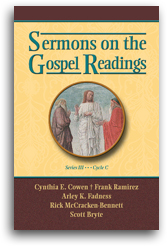SermonStudio
No ... On
Sermon
Sermons on the Gospel Readings
Series III, Cycle C
I've tried to get a handle on this Holy Week thing. How can Jesus be hailed as the one coming in the name of the Lord on Palm Sunday, delight the crowds with his wisdom, only to be condemned a few days later by the crowds who shouted "Crucify him!" and then mocked him as he hung in agony on the cross?
I believe that it happened, but what influences crowds to do the right thing -- and the wrong thing? The same crowd.
I believe that it happened, but what influences crowds to do the right thing -- and the wrong thing? The same crowd.


